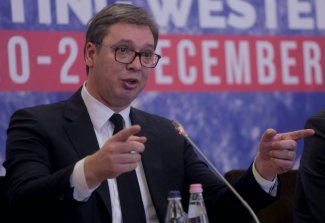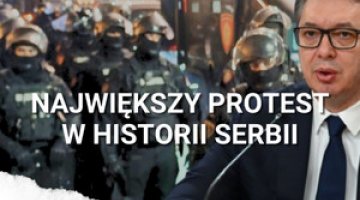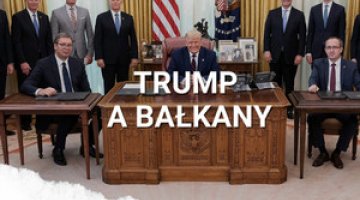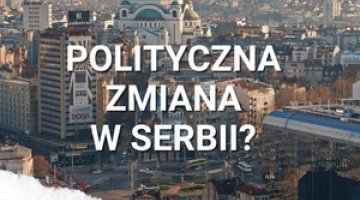Elections in Serbia: a display of Vučić’s domination

On 21 June, parliamentary, regional (to the parliament of the Autonomous Province of Vojvodina) and local elections were held in Serbia. The vote should have taken place on 26 April, but was postponed due to the state of emergency caused by the COVID-19 pandemic. According to preliminary results, the electoral list of President Aleksandar Vučić, leader of the Serbian Progressive Party (SNS), obtained 62.4% of the vote and 189 seats in the 250-member parliament. In second place, with 10.7% of the votes and 32 seats, came the group led by foreign minister Ivica Dačić, the leader of the Socialist Party of Serbia (SPS); the minority parties which cooperate closely with the government won 17 seats. Most of the opposition groups did not take part in the elections and called for a boycott, arguing that the ruling SNS’s control of the media and state institutions prevented voting in accordance with democratic standards. The turnout was a record low, amounting to around 50% (and only 35% in Belgrade).
Representatives of the EU and the OSCE confirmed that the dominance of the ruling party in the media did not allow the opposition to campaign on an equal footing. However, despite these reservations about the fairness of the elections, this issue will not hinder Belgrade’s relations with foreign countries: Vučić’s strong mandate is unquestioned, and the US and most EU countries are keen to resume the Kosovo-Serbia dialogue. However, the Serbian authorities are not ready to compromise with Prishtina. They will continue their multi-vector foreign policy of maintaining close relations with the most important EU and US countries, while at the same time deepening their cooperation with China, as well as with Turkey and Russia. No significant progress should be expected on Serbia’s path to the EU, as the reforms which the Union requires would threaten the position of the president.
The state apparatus in the president’s service
The SNS/SPS coalition has ruled Serbia since 2012. The last four years have seen the consolidation of the personal authority of President Vučić who, despite taking office in 2017, has not given up his position as party leader. Formally his prerogatives are very limited, but thanks to his control over the party and the state, he remains the strongest and most popular politician in Serbia. The full extent of his leadership over the party was confirmed by the election campaign, from which the other SNS politicians were virtually absent. The name of the electoral list – ‘Aleksandar Vučić—For Our Children’ – did not even include the name of the party in either the local or the parliamentary elections.
Vučić owes his position to his appointment of persons totally dependent on him to the most important positions in the state, even though they are often suspected of irregularities. One example was the appointment in 2017 of Prime Minister Ana Brnabić, who was not even a member of the ruling party at the time. During the rule of the SNS and the socialists, there has been a significant increase in corruption and nepotism, and the state institutions have been overrun by clientele networks. Those who wish to get a job in the extensive state sector must support the ruling party (over 10% of the entire population are members of the SNS). Vučić has consistently used the state apparatus and power structures to combat political opponents, activists, journalists and experts who criticise the ruling system in Serbia. State institutions and businessmen loyal to the president also have near-total control over the media sector, which allows them to build up the personal popularity of Vučić very effectively. The sole TV station critical of the government is only available on certain cable networks, and the pro-government tabloids stigmatise any dissenters as internal and external enemies who are acting against Serbia’s national interests and ruining the SNS leader’s personal efforts to develop the country. Vučic has also been aided by the improvement of the economic situation, especially in the context of the opposition’s last term of office in 2008–2012, which coincided with the peak of the global crisis. The last two years have brought stable economic growth rates of above 4%, a fall in unemployment to around 10%, and a reduction in public debt. Due to the structure of the economy, the effects of the COVID-19 pandemic will also be limited: it is estimated that Serbia’s GDP will fall by just 3%.
Divisions within the opposition
The opposition’s defeat is a consequence of several factors. First of all, the country’s system of power greatly limits the possibilities for protest movements to self-organise or for new groups to emerge. The opposition is made up of parties which have often been compromised by their time in government in the years 2000–2012; their politicians are in serious conflict with each other, and the SNS is trying to fuel these divisions further. Becoming involved in opposition activities risks the loss of one’s job; there are also significant fears related to violence against the ruling camp’s opponents. At the beginning of 2018, Oliver Ivanović, one of the leaders of the Serbian community in Kosovo, was shot dead, and in November 2018, the opposition politician Borko Stefanović was beaten up, which initiated anti-government demonstrations lasting several months.
The opposition cannot agree on how to conduct the political struggle against the increasingly authoritarian government, and it was unable to create a common strategy for the elections. Since 2014, it has been facing the dilemma of whether to participate in the democratic process. Both the European Commission and the OSCE/ODIHR have drawn attention to numerous electoral irregularities, which include non-transparent sources of party financing, the use by party structures of state institutions, and the biased way in which the elections have been reported in the media. The reports also highlight documented allegations of pressure being put on voters and public sector employees. The part of the parliamentary opposition which makes up the Alliance for Serbia has been boycotting the work of parliament since the beginning of 2019; it did not stand in the elections, and has called for a boycott of the vote. Members of the European Parliament and NGOs have attempted to mediate between the government and the opposition to develop democratic election rules. However, the talks were broken off because, according to the opposition, their sole intention was to legitimise the government on the international stage. In turn, the Free Citizens’ Movement and the ‘1 out of 5 million’ Platform, whose roots lie in the protest movements, did decide to participate in the elections. They did not gain much support, but they weakened the effectiveness of the calls for a boycott, and contributed to the greater legitimacy of the new parliament, although this is still dominated by the ruling camp. The turnout, at around 50%, was the lowest since 1991, but it was high enough for the government to use the election to further marginalise the opposition and adopt a yet harsher stance against its political opponents.
Integration with the EU: an exercise in window-dressing
Although integration with the EU should have been the government’s priority, with the president promising to conclude the negotiations by 2020, no significant progress has been made in this area over the past four years. Serbia began negotiations in 2014 and opened 18 of the 25 negotiation chapters (two have already been provisionally closed). The slow pace of this process is primarily due to the Serbian authorities’ reluctance to implement the reforms, as well as the EU rowing back on its priority areas, i.e. the chapters on justice and the rule of law. EU reports have highlighted serious problems concerning the holding of democratic elections, the actions of the parliament (which is totally subordinated to the executive) and media freedom. The Serbian government’s fight against corruption and organised crime has weakened, as indicated by the absence of any prosecutions for documented reports of high-level corruption. The scandal concerning the arms deal conducted by the father of the interior minister Nebojša Stefanović is a notorious example of this. Stefanović senior allegedly bought the weapons from the state-owned company Krušik at discount prices, but in this case only the employee who blew the whistle on the matter was brought to justice.
The West’s responses: doing deals trumps the rule of law
According to international rankings, democratic standards clearly weakened in Serbia in the period from 2016 to 2020. However, this has not translated into a cooling of the authorities’ relations with the EU or the US. Serbia is an important player in the region, and the stability of the entire Balkans depends on it. Both the US and certain EU countries, such as Germany, have been counting on progress in the normalisation of relations between Belgrade and Prishtina. By avoiding criticism of Vučić, they are also calculating that his strong political position in the country may incline him to take political responsibility for making a compromise with Kosovo. Vučić has skilfully played on these hopes while trying to balance between the West and Russia and China. Thanks to concessions and lucrative contracts for foreign businesses, he has also succeeded in winning foreign support. For example, Paris weakened its criticism of Serbia at the same time as the French company Vinci obtained a license in 2018 to manage Belgrade airport for another 25 years; and in 2019 the French government signed a letter of intent with the Belgrade authorities regarding the construction of a subway there. It is also relevant that the SNS works closely with its sister groups in the European People’s Party (the EPP president Donald Tusk openly supported President Vučić before the elections).
The balancing act between East and West
Formally Serbia remains interested in joining the EU, while at the same time it has been pursuing a multi-vector policy: in recent years, it has deepened its cooperation with China, as well as Russia and Turkey. Belgrade and Beijing have a particularly close relationship: diplomatic relations between the two countries have intensified significantly, and China is supporting Serbia in its actions against Kosovo, as neither country recognises its independence. Chinese companies have taken over key Serbian enterprises in the heavy-industry sector, such as the Železar Smederevo smelter (by Hesteel) and the mining & smelting enterprise RTB Bor (by Zijin). 2017 saw the start of the modernisation of the Belgrade-Budapest railway line, which is being carried out by Chinese companies and financed by Chinese loans. Serbia has also invited China to cooperate in developing the 5G network, and is working closely with Huawei on security technology.
Relations with Russia have also become closer. The TurkStream gas pipeline, which is intended to transport Russian gas via Turkey to EU countries, is being constructed on Serbian territory. The project is being implemented on a non-transparent basis, in violation of the Energy Community regulations. It will strengthen the position of Russian companies on the gas markets of south-eastern Europe by rendering void the EU’s plans to liberalise and integrate these markets. Also in recent years, Turkey has also become an important economic partner for Belgrade.
Prospects
Serbia will probably try to maintain its current policy of playing off the geopolitical interests of the region’s powers against each other. Although integration with the EU will be formally continued, the reform process itself will be slowed down even further; no progress should even be expected in this regard. Despite Serbia’s declarations of aspirations towards EU membership, the changes that would require are in conflict with the interests of the ruling party, as they would weaken its position and informal power structures. Belgrade will deepen its cooperation with China and (albeit to a lesser extent) with Russia and Turkey. The future of the dialogue between Serbia and Kosovo will depend primarily on the determination and cooperation of the US and the EU, because Belgrade is uninterested in finding a lasting solution to the conflict with Prishtina. In fact, the status quo is beneficial for Serbia; it strengthens the position of President Vučić and his political camp both at home and abroad, while maintaining their influence on the situation in Kosovo.




